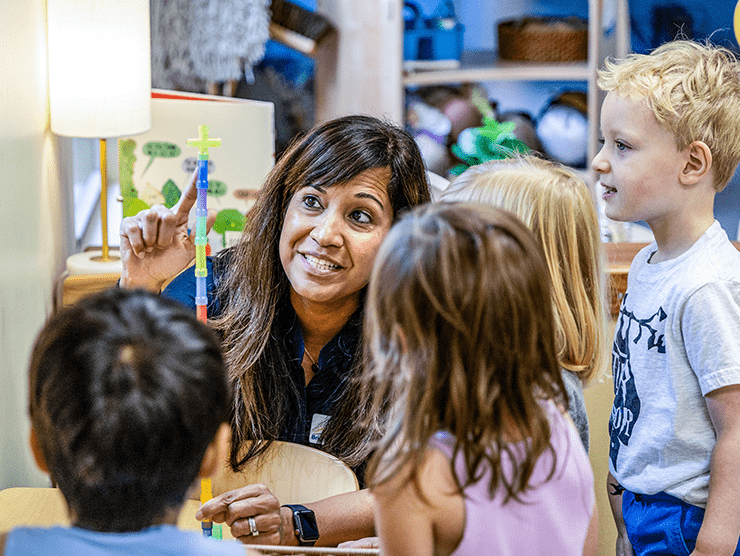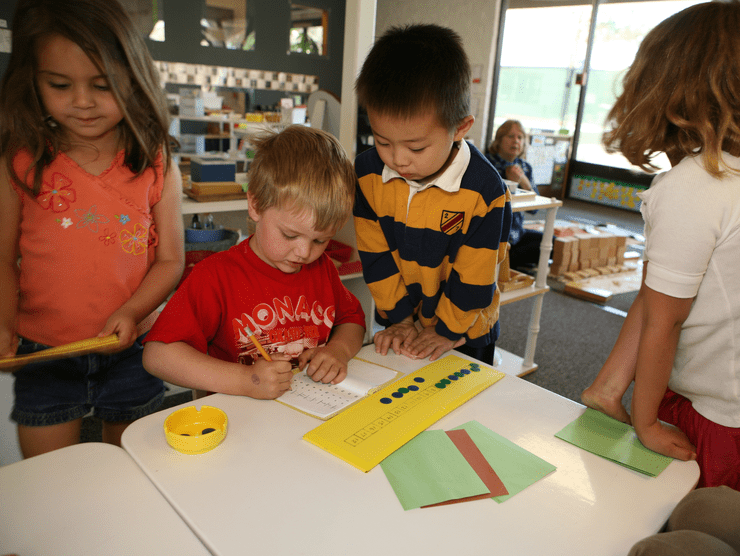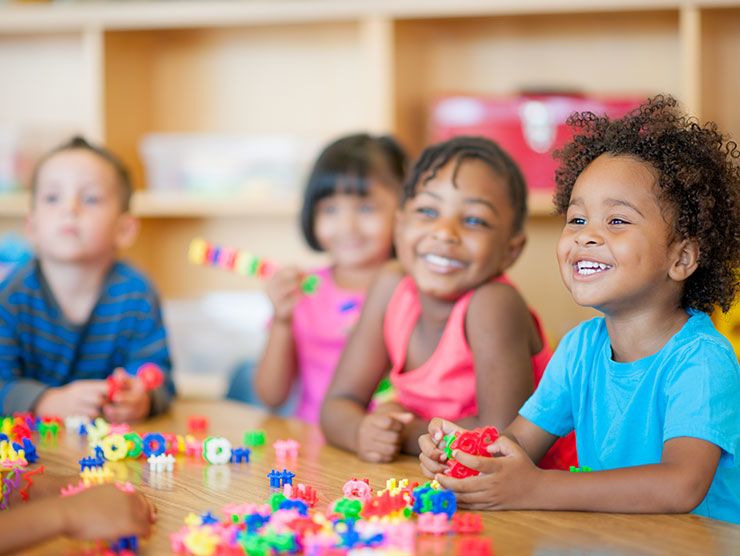For many parents, choosing child care is one of the most important decisions they’ll make. Among the various options, daycare often emerges as a primary consideration, offering structured environments and professional care. However, as you weigh your choices, a fundamental question arises: “Is daycare good for kids?”
It’s a question rooted in genuine parental concern, and it’s important to know that there isn’t a one-size-fits-all answer. What matters most is to find a quality child care setting that provides a safe and stimulating environment, supports your child development and aligns with your family’s needs.
What is daycare?
Often referred to as child care centers or early learning centers, daycare is a supervised care arrangement for children, typically outside of their homes. Its primary purpose is to provide a safe, nurturing, and enriching environment for infants, toddlers, and preschoolers while their parents are at work, attending school, or fulfilling other commitments.
Child care centers are ideal for families seeking a structured, social, and educational environment for their children. Quality child care programs are designed with intentionality, aiming to foster holistic development in young children. They offer a routine that can be beneficial for children, often including dedicated times for play and learning.
Is daycare better than staying home?
There’s no right answer, and ultimately the choice is up to you and what fits best for your family. Deciding between daycare and staying home with children is a personal choice that depends on a family's unique circumstances, values, and the child's temperament. Daycare offers structured socialization, early learning opportunities, and exposure to diverse environments, which can be especially beneficial for children who thrive in social settings. It also allows parents to maintain their careers, contributing to financial stability and personal fulfillment. However, daycare can be costly, and some parents worry about the quality of care or the risk of frequent illnesses due to group settings.
On the other hand, staying home with children provides a consistent, one-on-one nurturing environment, which can be ideal for children who need more emotional support or have special needs. It allows parents to tailor daily routines and learning experiences to their child’s pace and interests. Yet, it may come with financial strain due to lost income and potential feelings of isolation or burnout for the stay-at-home parent.
Common myths include the idea that daycare leads to behavioral issues or that stay-at-home parenting limits a child’s social development. In reality, high-quality daycare can support emotional and cognitive growth, and stay-at-home parents can foster social skills through playgroups and community activities. Ultimately, the best choice is the one that aligns with the family’s needs, values, and the child’s well-being.Benefits of daycare
The influence of a good daycare program can positively impact various aspects of a child’s development:
- Social development: daycare provides a crucial arena for children to interact with peers and adults outside of their family unit. They learn essential social skills such as sharing, cooperation, conflict resolution, empathy, and how to navigate group dynamics.
- Emotional development: children in daycare learn to express their emotions in a structured setting, build resilience, and develop independence as they spend time away from their primary caregivers. Positive relationships with consistent caregivers also contribute to their emotional security.
- Cognitive development: many daycare programs incorporate age-appropriate educational activities, ranging from storytelling and early literacy to basic math concepts and problem-solving through play. This exposure to new ideas and guided learning helps stimulate cognitive growth and prepare children for formal schooling.
- Physical development: daycare centers typically include opportunities for both fine and gross motor skill development through structured play, outdoor activities, and creative movement. Children engage in activities that enhance coordination, balance, and dexterity.
7 steps to choose the best daycare for your family
Finding the right daycare takes time and thoughtful consideration. Here’s a step-by-step guide to help you make an informed decision.
- Define your priorities: Consider what matters most to your family. Is it location? Do you need specific hours to accommodate your work schedule? What learning and development philosophies are important to you? Understanding your non-negotiables and preferences from the outset will help you narrow down your search.
- Research and gather information: Ask friends, family, neighbors, and colleagues for their recommendations. Online resources are also invaluable. Check parent forums, local community groups, and review sites. Always verify that any potential daycare is licensed by your state’s regulatory body.
- Schedule visits and observe teacher-child interactions: once you have a shortlist, schedule visits to each daycare. This is perhaps the most crucial step. During your visit, don’t just take a quick tour, take time to observe. Pay close attention to the overall atmosphere and the child-teacher interactions. Does it feel welcoming, happy, and calm? Are the caregivers warm, engaging and responsive to the children’s needs? Do they get down to eye level, make eye contact, and interact positively?
- Ask the right questions: inquire about staff qualifications and educational backgrounds. Consider child-to-staff ratios. Ask about daily routines and activities. What does communication with parents look like throughout the day? How do they handle challenging behaviors?
- Assess cleanliness and safety measures: a safe and healthy environment is non-negotiable. Is the facility tidy, well-maintained, and hygienic? Are outlets covered, hazardous materials out of reach? How are the entry points secured? What emergency plans are in place? Is there a secure outdoor area?
- Review the curriculum: beyond just play, a quality daycare will have a structured curriculum or learning approach that promotes development. Ask about age-appropriate activities and how they are tailored to developmental stages. How do they cater to the unique needs and interests of each child? Look for a balance of free play, structured learning, creative play, and gross motor activities.
- Trust your instincts: after your research and visits, trust your gut feeling. How does the daycare center make you feel? Do you have a sense of comfort and confidence leaving your child there? Observe how your child reacts during the visit. Your parental instincts are powerful tools in this decision-making process.
So, is daycare good for kids? When it’s high-quality and aligned with your family’s needs, the answer is a resounding yes. Daycare can support your child’s social, emotional, cognitive, and physical development while giving you peace of mind.
At Bright Horizons, our child care programs offer safe, engaging, and enriching environments to help children reach their full potential. We focus on your child’s individual strengths and meet them where they are, nurturing their full potential. Ready to explore your options? Find a center near you.





